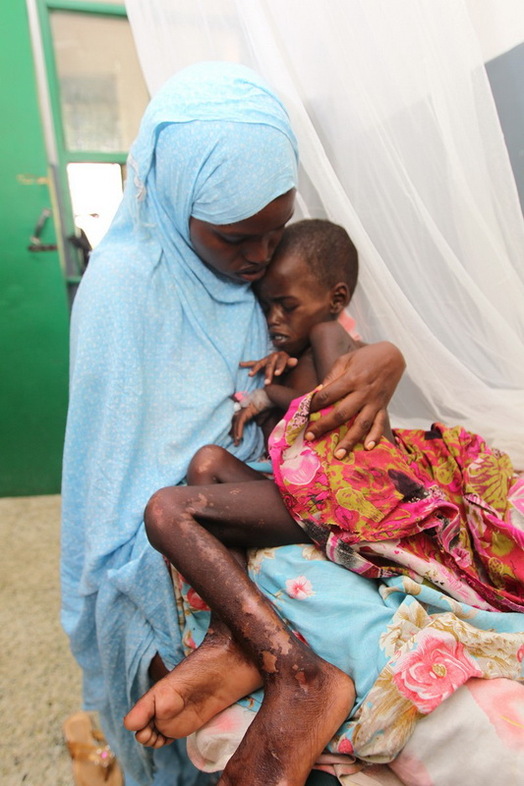
Kenya is the leading one among countries where Somali people fleeing their homes due to hunger and drought take shelter. Around 1,500 people arrive at the Dadaab Refugee Camp in Kenya every day but there are no longer any camps in Kenya where newcomers can take shelter as Kenya is also suffering from drought. Mustafa Kavakdan, deputy chairman of the IHH, who is now in the Dadaab camp said the situation of the people who are on their way to the camps is worse and more risky than the situation of the people in the camps.
Situation worse in Somali
Members from the IHH teams that provide aid to refugees who live in difficult circumstances in Dadaab camp in Kenya noted that people from Somali who walk kilometers of distance to arrive at the camp fall exhausted before they even reach the camps and wait for their death in the desert.
Kavakdan said: “We have passed the Somali side form Liboy, a border town of Kenya. We came across with hundreds of refugees in Dobley, a town on the Somali border. People who take refuge at the Dadaab camp receive aid anyhow but the situation of people who fled Mogadishu and are still on their way to the camps is really worse. Here, you can see the extent of the disaster.”
We help people on their way to the camps
IHH teams on the Somali side take Somali people who make long and tiring journeys to reach the camps from places close to the camps and take them to the camps where they can have access to more aid via vehicles. Terming the situation of the people they come across as “heartbreaking,” Kavakdan said: “We meet with people on the roads who want to come to the camps in Kenya in search of food. There are old people and children among them. These people face death risk due to scorching heat. Old people in particular need to get aid to be able to walk. These people are fighting against death under heavy circumstances. We met with a family which wanted to reach the camp to find some food. It was a small family with a mother and her children and we learned that they walked for 200 kilometers, fell exhausted because of walking and since they have no place to stay, they sleep in an open area. With a three-convoy vehicle, we helped these people to reach the camps. We took 50 people we came across on the roads to safer places via these vehicles. The situation of the people on the roads is worse than the situation of those in the camps. There are frequent deaths on the roads. As the IHH, we are making preparations to organize our relief efforts in Somali and try to figure out what we can for those people.”
We treat the sick in the camps
IHH is particularly trying to prevent the severe drought in Kenya and Somali from turning into a humanitarian disaster. Mahmut Coşkun, a member of the IHH partner International Doctors’ Union, said he helps the treatment of the sick people in the camps. Medical examinations have been offered to 150 children in the camps while the sick ones have been given the necessary medication.
IHH supports refugees
Giving information about the IHH’s relief efforts in the region, Kavakdan said the foundation has distributed aid packages with a cost of $40,000 to the refugees and that each aid package contains milk, biscuits, rice, vegetable oil and flour. He said the IHH tries to take aid particularly to those people who set out to join the camps but have failed to do so, adding that there was need for more to be done to bring the situation back to normal in Somali.
3,000 tons of aid to be a remedy for Somali
In order to extend a helping hand to the African people, the IHH is preparing to send a ship carrying 3,000 tons of emergency humanitarian aid supplies to Somali. The ship will be carrying packages of wheat, corn, flour, vegetable oil, sugar, milk powder, biscuits, rice and pasta in addition to medicine and medical supplies which are urgently needed by the drought-stricken Africans.
NGOs should take urgent action
Kavakdan said the humanitarian tragedy in the region is hard to describe as he called on all the non-governmental organizations in Turkey to take action to help East Africa. “Turkish Red Crescent and other relief organizations should take urgent action. There is a heartbreaking situation here. There are scenes which make us feel shame on the name of the humanity. We make a call to the Turkish nation from here. Let’s come and prevent humanity from failing in Africa altogether,” said Kavakdan.